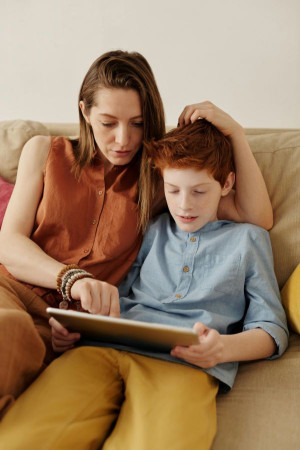Resources
 This webpage will bring together all our children’s privacy related information and provide links to other webpages and child and young person related information.
This webpage will bring together all our children’s privacy related information and provide links to other webpages and child and young person related information.
In September 2023 we launched the Children's Privacy Project, which looked at how children’s privacy is being protected and whether the rules protecting children’s privacy rights are working.
There are some unique challenges and opportunities that relate to the privacy of children and young people as they interact with health and education services and the online world.
To understand these challenges, in late 2023 we consulted with government agencies, professionals who work with children (teachers, doctors, nurses, etc), and non-governmental organisations who advocate for children and young people. We asked them for their thoughts on how to improve children’s privacy in New Zealand.
In April 2024, we released our report summarising the themes and messages we heard during our Children's Privacy Project.
Overview of our Children’s Privacy Project guidance
The next phase of the project is the development of guidance covering some of the key themes we heard from our engagement.
Our guidance aims to:
- Lift understanding of children’s privacy rights across the children’s sector.
- Provide those working in the children’s sector with best practice privacy advice to ensure children and young people’s privacy rights are protected and respected.
- Empower children and young people (and their parents/caregivers) to understand and exercise their privacy rights effectively.
We will be developing guidance covering a variety of topics using a variety of formats. Following is a high-level summary of the guidance we will be developing throughout 2025.
Detailed Best Practice Guides
Detailed best practice guides are comprehensive guidance documents focusing on a specific area within the children’s sector. These guides are designed to assist people working within a specific area/industry to design and implement best practice privacy practices as they relate to children and young people.
Our first detailed best practice guide will focus on the education sector. This guidance will be applicable to all areas of the sector – whether you are a teacher at an early learning centre, a primary or intermediate school, or at a college or a person or organisation working with students to support learning needs.
The guidance will cover areas such as:
- Responsibilities under the Privacy Act 2020
- Privacy, Security and Confidentiality
- Collecting, using and sharing information
- Keeping students and parents/caregiver informed
- Consent
- Special Categories of information
- Accuracy of information
- Keeping information safe and secure
- Retaining and disposing of information
- Wellbeing and safety (including online/digital safety)
- Managing requests for information
- Managing privacy breaches and near misses
- Education technology
- Managing privacy complaints.
To ensure this guidance is fit for purpose an expert advisory group made up of specialists across the education sector will help support us from development through to publication.
Privacy Best Practice Guides
Best practice guides are shorter, topic specific guidance documents. These are designed to help people working within the education sector establish privacy enhancing practices in areas where privacy harms can occur.
These best practice guides will cover:
- School enrolment forms
- Collection and use of digital images and recordings
- What does fair and reasonable mean in practice (IPP4)
- Responding to IPP 6 requests.
Visual Guides
To help provide meaningful guidance and advise for children and young people (and their parents/caregivers) we will be designing visual guides such as posters.
These visual guides will cover:
- How can I protect my privacy online (for children/young people)
- Protecting your child’s privacy online (for parents/caregivers)
- What is privacy and how can I exercise my rights (for children/young people)
These visuals guides will be downloadable so you can print them out and utilise them within your working environment (for example, place them within your ECE or school, use them as part of your digital literacy lessons, share them with your parent/caregiver community, make them available to children as part of the services you provide them).
Questions and how to contact us
If you have any questions about the Children’s Privacy Project or would like to be added to our Children’s Privacy Project updates email list, you can contact us at children@privacy.org.nz.

 This webpage will bring together all our children’s privacy related information and provide links to other webpages and child and young person related information.
This webpage will bring together all our children’s privacy related information and provide links to other webpages and child and young person related information.